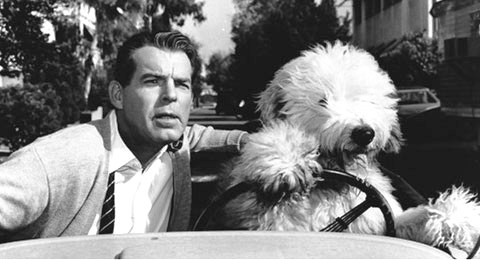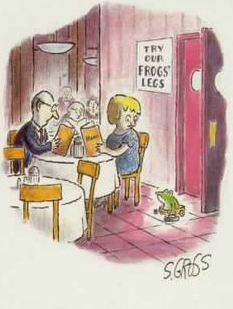CSotD: Puns, Magic and Shaggy Dogs
Skip to commentsDiscussion in the comments section the other day revealed quite a bit of confusion around the term “pun” and the term “shaggy dog story.” I promised to try to straighten it out today, and, by sheer luck, Pearls Before Swine (AMS) offered not only a festival of puns on Sunday but skipped its usual last-panel apology in favor of celebrating their achievement.
As well they might: This is a triumph of punning, and I’ll admit I only got 18 of the 19 state capitals in this strip.
As I said the other day, there are people who resent being made to feel foolish by a subtle pun they didn’t catch, but I was happy to search out the ones I found and I’ll likely come back to look for the other one. (Ooo — I just spotted it!)
It’s a bit like close-up magic: I get a kick out of figuring out how the trick works, but only if the magician is skilled enough to make it challenging. And if I can’t figure it out, I don’t want to be told. I want to continue to puzzle over it, even if I never get how it happened.
Being told or (gasp!) looking up answers is a spoiler.
None of which has anything to do with shaggy dog stories, even though a pun can take a long time to set up.
My elementary school principal loved long stories that ended in puns, and I remember once in high school when we ended up in a crowded barber shop at the same time and we swapped complex puns while we waited, each determined not to crack a smile as the stories wound out, until the punchline drew a laugh from the whole place.
In fact, that was where I first heard this one.
Similarly, Pearls fans know that the comic is noted for Sunday strips that stretch out a complicated storyline that turns out to be a set up for a ridiculous pun.
Listening to elaborate puns is, indeed, not unlike watching close-up magic, because, as the magician is talking and shuffling cards or whathaveyou, you’re not simply watching, but trying to anticipate where he’s going, why he makes a particular motion or says a particular phrase and how it’s all going to come out at the climax.
Most close-up magic happens fast, but back in the days of VHS recorders, Penn and Teller set up a do-it-yourself card trick that could take hours or even days, if you wanted it to.
The set-up was that you would try to perform an “Is this your card?” trick and fail miserably.
What the mark didn’t know was that you had taped a short segment from Penn and Teller and edited it into some other programming. Having “failed” at the trick, you’d turn on the TV instead and at some point later, while you were watching something else, Penn Jillette would suddenly appear on the screen, say “Is this your card?” and hold up the correct one.
It was long, and it certainly involved a lot of set up — including learning how to force a card — but it was not a shaggy dog story: It was a magic trick.
A shaggy dog story, by contrast, does not end in a punchline or an amazing magic trick and, in fact, it barely seems to have any ending at all.
In “Roughing It,” Mark Twain recalls a fellow whose interminable stories never went anywhere, and it’s frequently cited as a shaggy dog story, though I think it lacks the form and substance of the true thing.
Listening to someone who can’t focus on their narrative is simply annoying and tiresome. You don’t wonder where it’s going because it obviously isn’t going anywhere.
A true shaggy dog story keeps you engaged, because it’s so finely crafted and well-told that you’re sure that, like a magic trick, it’s going to suddenly end in a crescendo of wonderfulness that makes it all worthwhile.
But it doesn’t, which is the point.
Granted, it amazes you at the end, but only with the incredible bathos of the whole thing. The trick to a good shaggy dog story is that the quality of the storytelling makes it all fascinating until … well, nothing.
Here, according to an old book cited by Stephen Greensted, is the original story from which the term “shaggy dog story” is taken.
However, it has been significantly shortened. I’ve heard a good storyteller stretch it out to at least 10 minutes, with far more details and far more stops along the way.
A tramp was walking along a London street when he picked up a copy of the Evening Standard. And there he read a small advertisement which said, “Lost shaggy dog. Distraught millionaire offers £1m reward for return of said mutt. Easily identified. You will never have seen a shaggier dog. 100 Cheyne Walk, London, SW10.”
At that precise moment a dog walked by. It was the shaggiest dog the tramp had ever seen, and it was by itself. Without hesitation, the tramp apprehended the dog and went straight to Cheyne Walk.
“I am so sorry, sir,” said the lady who answered the door, “but that is an old advertisement. Mr Linebacker has left for Montevideo.”
So the tramp and the dog stowed away on a ship, got off at Montevideo, and went straight to the Linebacker address. “Oh, so sorry,” said the maid who answered the door. “He’s on holiday in Sydney.” Without a word, the man and the extraordinarily shaggy dog ran to the harbour and stowed away on a second ship, bound for Australia.
Alas, they missed the millionaire there, too. The butler who opened the door said, “It is my duty to inform you that Mr Linebacker has returned to London to count his millions.”
So, the tramp and the fantastically shaggy dog returned to 100 Cheyne Walk.
They were immediately ushered in to the presence of the great man, Mr Ebenezer Linebacker The Third.
“Have you got my shaggy dog, the shaggiest in the world?!” he cried. “I swore I’d pay a million pounds for his safe return, and that, indeed, I shall.”
Triumphantly, the tramp revealed the dog. “Here, sir,” he cried, “is your dog! The shaggiest in the world!!”
Mr Linebacker looked at the dog and said, “Oh, no! That’s not my dog. He’s nowhere near as shaggy as that!”





Comments 10
Comments are closed.